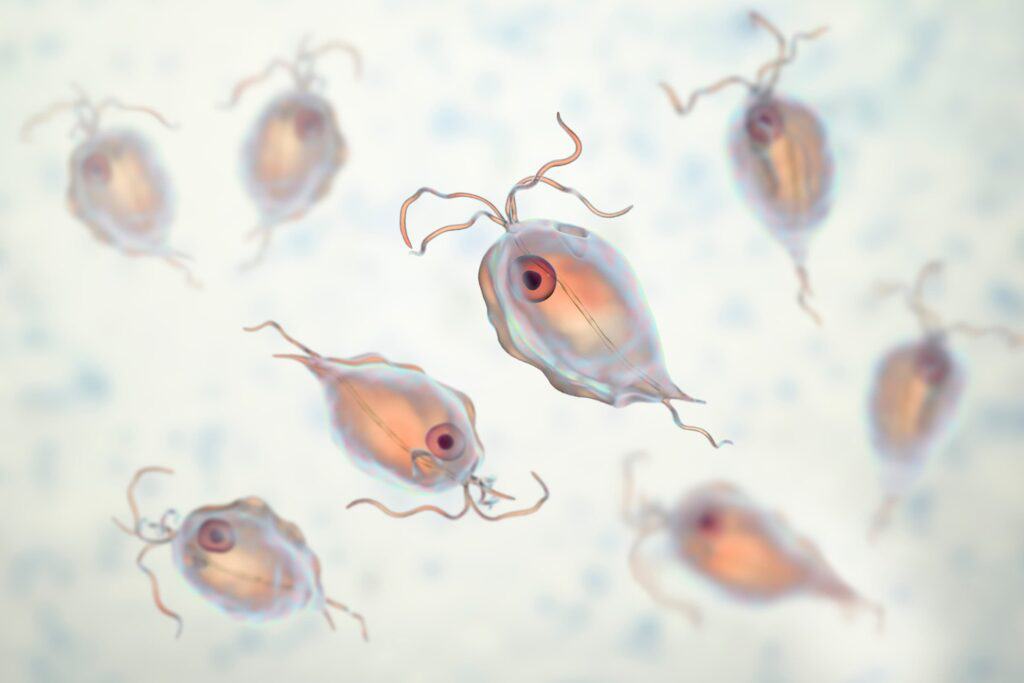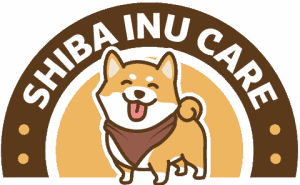This post contains affiliate links.
If you have a Shiba Inu, you know how much joy and entertainment they bring into your life. Unfortunately, like all dogs, they are susceptible to various illnesses, including Giardia. Giardia is a parasitic infection that can cause diarrhea, vomiting, and weight loss in dogs. If left untreated, it can lead to more severe health problems.

The good news is that Giardia is treatable in Shiba Inus. The first step is to take your dog to the vet for a proper diagnosis. Your vet will likely perform a fecal test to confirm the presence of Giardia. Once verified, your vet will prescribe medication to treat the infection. Following the defined treatment plan is essential to ensure the infection is fully cleared up. Additionally, it’s crucial to clean and disinfect your dog’s living area to prevent reinfection.
What Is Giardia?
Giardia is a parasite that can infect both humans and animals, including dogs. It is a germ that can cause a gastrointestinal infection called giardiasis. This parasite is commonly found in water sources such as rivers, lakes, streams, and contaminated soil.
Is Giardia In Dangerous In Dogs?
Giardia infection in dogs is not typically life-threatening, but it can cause symptoms such as diarrhea, vomiting, and weight loss. In some cases, the infection can be chronic, leading to long-term health problems.
It is important to note that Giardia can be easily spread from one dog to another through contact with infected feces or contaminated water sources. Therefore, taking necessary precautions when dealing with infected dogs is essential.
If you suspect that your Shiba Inu has been infected with Giardia, it is essential to seek veterinary care immediately. Your veterinarian can diagnose the infection through a fecal sample analysis and provide appropriate treatment to help your dog recover.
How Do Dogs Get Giardia?
Giardia is a common parasite that can infect dogs, including Shiba Inus. The parasite is found in contaminated water, soil, and feces. Your dog can become infected with Giardia by swallowing the parasite in contaminated water or food or by licking or sniffing contaminated objects or surfaces.
Dogs that drink from lakes, rivers, or other untreated water sources are at a higher risk of getting infected with Giardia. The parasite can also be found in the ground, which means that dogs that like to dig or play in the dirt are also at risk.
Dogs that come into contact with feces from infected animals can also become infected with Giardia. This can happen if your dog sniffs or licks contaminated feces while out on walks or in the backyard.
It’s important to note that Giardia can survive outside of a host for long periods, meaning that contaminated water sources, soil, and surfaces can remain infectious for weeks or even months.
To reduce the risk of your Shiba Inu getting infected with Giardia, it’s important always to supervise them when they are outside and to prevent them from drinking from untreated water sources. You should also clean up after your dog promptly and dispose of their waste correctly to prevent contamination of the environment.
Symptoms of Giardia Infection In Shiba Inus
If your Shiba Inu is feeling sick, it’s essential to know the signs and symptoms of giardia infection. Giardia is a common parasite that can cause diarrhea, nausea, and gas in dogs, including Shiba Inus. Here are some common symptoms of giardia infection in Shiba Inus:
- Diarrhea: One of the most common signs of giardia infection is diarrhea. Your Shiba Inu may have loose, watery stools that are more frequent than normal. The diarrhea may also have a foul odor.
- Nausea: Giardia can cause your Shiba Inu to feel nauseous and may result in vomiting. If your dog is vomiting, it’s important to make sure they stay hydrated.
- Gas: Another common symptom of giardia infection is excessive gas. Your Shiba Inu may have a lot of flatulence, and the gas may have a foul odor.
If you notice any of these symptoms in your Shiba Inu, you must take them to the vet for a diagnosis. Giardia infection can be treated with medication, but it’s important to catch it early to prevent further complications. Additionally, Giardia can be easily spread to other dogs, so it’s important to keep your Shiba Inu away from other dogs until they are fully recovered.
How To Treat Your Shiba’s Giardia
If your Shiba Inu has been diagnosed with Giardia, starting treatment as soon as possible is important. The goal of treatment is to eliminate the parasite from your dog’s system and prevent further spread of the infection.
The most common treatment for Giardia is the use of antibiotics, specifically metronidazole. This medication is effective at killing the parasite and is usually given for a period of 5-7 days. Your veterinarian will determine the appropriate dosage based on your dog’s weight.
In addition to medication, it’s important to keep your Shiba Inu hydrated. Giardia can cause diarrhea, which can lead to dehydration. Make sure your dog has access to clean water at all times, and consider adding an electrolyte solution to their water bowl to help replace lost fluids.
It’s also important to clean and disinfect your home and any areas where your dog spends time. Giardia can survive outside of the body for several weeks, so it’s important to thoroughly clean any surfaces that may have come into contact with infected feces.
While the prognosis for Giardia is generally good with prompt treatment, it’s important to follow your veterinarian’s instructions closely and complete the full course of medication. Failure to do so can lead to a recurrence of the infection.
What Can I Feed My Dog with Giardia?
When your Shiba Inu is diagnosed with Giardia, providing them with a nutritious diet that supports their immune system and promotes healing is important. Here are some guidelines to follow when feeding your dog with Giardia:
1) High-quality, easily digestible food
Choose a high-quality dog food that is easily digestible and free from artificial additives. Look for food that contains real meat as the first ingredient, and avoid foods that contain fillers such as corn and wheat. This will help to support your dog’s digestive system and promote healing.
2) Probiotics and prebiotics
Probiotics and prebiotics can help to restore the balance of good bacteria in your dog’s gut, which Giardia can disrupt. Look for dog food that contains probiotics and prebiotics, or consider adding a supplement to your dog’s diet.
3) Low-fat diet
Giardia can cause inflammation in the digestive tract, so feeding your dog a low-fat diet is essential. This will help to reduce inflammation and promote healing. Look for dog food that is low in fat, or consider cooking your dog’s food at home using lean meats and vegetables.
4) Small, frequent meals
When your dog has Giardia, feeding them small, frequent meals throughout the day is important. This will help to reduce the workload on their digestive system and promote healing. Consider feeding your dog three to four small meals per day rather than one or two large meals.
5) Plenty of water
Giardia can cause dehydration, so it is crucial to ensure that your dog has plenty of fresh, clean water available at all times. Consider adding a little bit of low-sodium chicken broth to your dog’s water to encourage them to drink more.
By following these guidelines, you can help to support your dog’s immune system and promote healing during their recovery from Giardia. Remember to consult with your veterinarian before making any changes to your dog’s diet, and always provide plenty of love and care during their recovery.
Do I Need To Disinfect My House If My Dog Has Giardia?
If your Shiba Inu has been diagnosed with Giardia, it is important to take steps to prevent the spread of the infection to other pets and people in your household. One of the most important steps you can take is to disinfect your house.
How Do I Disinfect My House From Giardia?
Giardia can survive for several months in the environment, so it is important to disinfect your home to prevent reinfection thoroughly. Here are some steps you can take to disinfect your house:
- Clean all surfaces with a bleach solution: Mix one part bleach with nine parts water and use this solution to clean all surfaces in your home, including floors, walls, and furniture. Be sure to wear gloves and avoid getting the solution in your eyes or on your skin.
- Wash all bedding and linens: Wash all bedding and linens in hot water and detergent. Dry them in a hot dryer for at least 20 minutes.
- Clean all toys and food/water bowls: Soak all toys and food/water bowls in a bleach solution for at least 10 minutes. Rinse them thoroughly with water and let them air dry.
- Vacuum all carpets and upholstery: Vacuum all carpets and upholstery thoroughly, paying special attention to areas where your dog spends time. Empty the vacuum bag or canister outside of your home.
- Limit person-to-person contact: Giardia can be spread from person to person, so limiting contact with your dog is important until the infection has cleared up. Wash your hands frequently and avoid sharing food or drinks with your dog.
By taking these steps, you can help prevent the spread of Giardia in your home and keep your Shiba Inu and other pets healthy.
Summary
Treating Giardia in Shiba Inus can be challenging, but with the right approach, it is possible to manage the condition effectively. Here are some key points to keep in mind:
- Giardia is a common parasite that can cause diarrhea and other gastrointestinal symptoms in dogs, including Shiba Inus.
- The most effective treatment for Giardia is a combination of medication and environmental management.
- Medications like metronidazole, fenbendazole, and albendazole commonly treat Giardia in dogs, including Shiba Inus.
- Environmental management involves cleaning and disinfecting your dog’s living area and practicing good hygiene to prevent the spread of the parasite.
- It is important to work closely with your veterinarian to develop a treatment plan that is tailored to your Shiba Inu’s specific needs.
- Follow-up testing is necessary to ensure the treatment’s success and monitor for any potential relapses.
Overall, treating Giardia in Shiba Inu requires a comprehensive approach that addresses both the parasite and its environmental factors. With the right treatment plan and ongoing management, you can help your Shiba Inu recover from Giardia and maintain good health.
Frequently Asked Questions
Is Giardia In Dogs A Big Deal?
Giardia in dogs can be a big deal if left untreated. It can cause diarrhea, vomiting, weight loss, and other digestive issues. If your dog is showing any symptoms of Giardia, it’s important to take them to the vet for proper diagnosis and treatment.
Why Is Giardia So Hard To Get Rid Of In Dogs?
Giardia is hard to get rid of in dogs because it’s a parasite that can survive in the environment for months. It’s also resistant to many common disinfectants, making it challenging to eliminate from your dog’s environment. Additionally, dogs can easily become reinfected if they come into contact with contaminated feces or water sources.
Can I Get Giardia from My Dog Licking Me?
It’s possible to get Giardia from your dog if they have the parasite in their feces or on their fur. However, the risk of transmission is low as long as you practice good hygiene, such as washing your hands thoroughly after handling your dog or cleaning up after them.
Does Pumpkin Help Dogs With Giardia?
While pumpkin can help firm up a dog’s stool, there is no evidence to suggest that it is an effective treatment for Giardia. It’s important to follow your vet’s recommended treatment plan, which may include medication, dietary changes, and environmental management.
